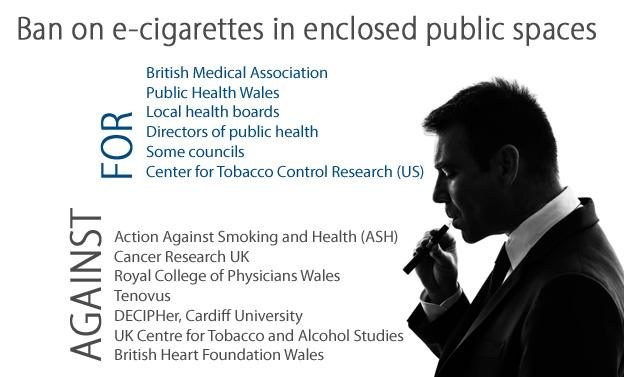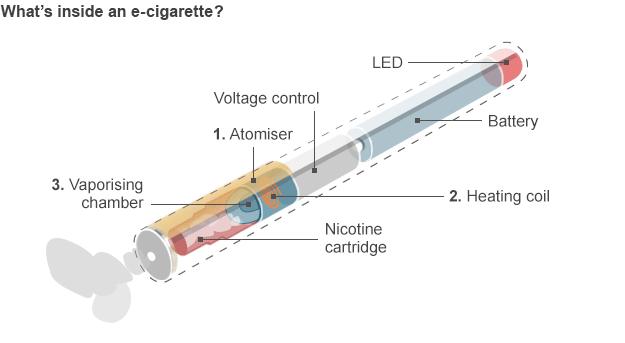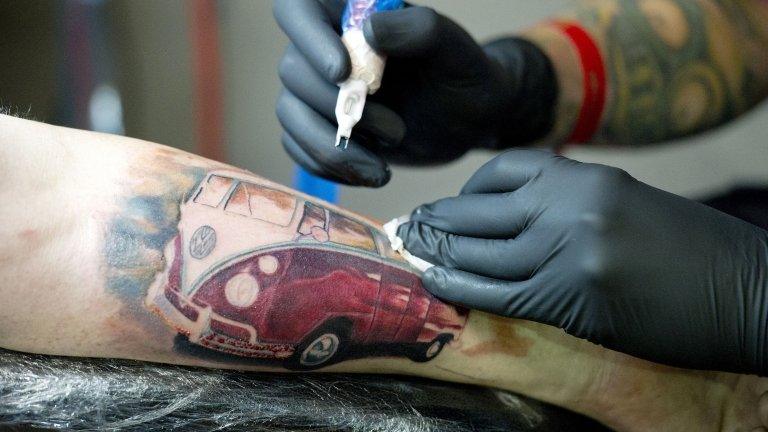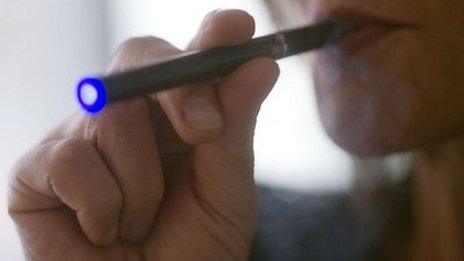E-cigarette ban in enclosed spaces in Wales pushes ahead
- Published
- comments

Ministers believe e-cigarettes are a 'gateway' for young people to start smoking by normalising it
People will be banned from using e-cigarettes in enclosed places such as restaurants, pubs and at work in Wales, under a new public health law.
The plan, likely to come into force in 2017 and the first in the UK, has already divided opinion among health and medical groups, including some anti-smoking campaigners.
But ministers say it is a "balance of risk" and will stop children smoking.
Tattoo parlours will also need licences under the Public Health Bill.
In taking the decision to bring in the e-cigarette ban, ministers have argued they did not want to take the risk of seeing smoking "normalised" again after the success of the smoking ban.
The new tobacco and e-cigarette measures will mean:
Shops will have to join a register for retailers of tobacco and e-cigarettes - aimed at stopping illegal sales to under-18s
It will be an offence to "hand over" tobacco and e-cigarettes to children - and this will include online sales
A restricted use of e-cigarettes, banning them in enclosed public spaces and workplaces - this will include lorries and taxis
This final measure is proving the most controversial and is likely to come into force in 2017, but a precise date has not been given.


The divided opinions in response to the initial proposals last year

There is opposition to the ban from different quarters

Public Health Wales, local health boards and the BMA are in favour of the e-cigarettes curbs.
But anti-smoking campaign group ASH Wales, Cancer Research UK and Tenovus are among those opposed and the British Heart Foundation, British Lung Foundation and Royal College of Physicians, external want more evidence.
In a public consultation on the proposals last year, 79% of responses were opposed.

Smoking statistics
19%
of adults in Wales smoke
16%
target by 2020
-
70% of smokers want to quit
-
44% tried to quit in past year
-
2.6m British adults use e-cigarettes
-
61% of vapers want to quit smoking

There have been concerns that it might make it more difficult for smokers using e-cigarettes as a way of stopping.
George Butterworth, tobacco policy manager for Cancer Research UK, said there was no evidence of normalisation of e-cigarettes with young people - and those using them were "very, very small numbers".
"Those that are, are the type of people who would try alcohol or tobacco cigarettes anyway - so without that evidence we wouldn't support a ban on the use of e-cigarettes indoors under the idea of normalisation," he said.
"E-cigarettes are an opportunity for people to move away from tobacco smoking which is very, very bad for their health, and we wouldn't want to put up any barriers to prevent people from quitting cigarettes. "

Analysis
By Nick Triggle, health correspondent
E-cigarettes have really divided health opinion - and that in turn has caused confusion.
However, the arguments for and against them are in fact typical of many that have been heard down the years in the field of health. That is to say it is all about balancing risk and benefit - and as evidence is still emerging it is only natural to find a variety of opinion.
On their own, there is little to recommend the use of e-cigarettes. They contain some toxins and, therefore, in theory are potentially harmful - both to those using them and, possibly, through passive smoking.
But this debate is further complicated by the fact that it is not just the merits of e-cigarettes that are being discussed, but their impact on smoking tobacco products. Some, for example, have argued they act as a gateway to real smoking.
But, of course, e-cigarettes cannot be seen in isolation. Smoking them - and this is about the only thing that is not disputed - is less harmful than tobacco products. That, in a nutshell, is why some claim they should be treated sympathetically.



Officials acknowledge there is divided opinion but believe the evidence is now growing to support a ban. Although the numbers of children using e-cigarettes are low, ministers do not want to take the risk of children seeing smoking "normalised" again after the success in banning smoking.
There are similar e-cigarette restrictions in countries like Belgium, Spain and Malta, with proposals in France and Ireland. But this would be a first for the UK.
The BMA says it is "vital" that e-cigarettes do not undermine tobacco control and they are particularly worried that the way they are marketed is making them attractive to children.
It also says more research is needed to find out whether e-cigarettes actually help smokers to quit.

TATTOOS AND PIERCINGS
Katan Costello, who runs the Two Hearts Tattoo Studio in Cardiff, calls the proposed licensing system 'brilliant'
A licensing system is also being drawn up with the tattoo and piercing industry - to produce enforceable professional hygiene and health standards by 2017.
There are already around 350 tattoo premises with licences in Wales but there are many others, including self-taught tattooists called "scratchers".
It is a recognition that times have changed dramatically since the last legislation in the early 1980s, with tattoos and piercings more popular.
There will also be a ban on intimate piercings for the under-16s.
Ministers say the industry welcomes the new system - backed up by the threat of prosecution and fines - which will see tattooists having to show they are competent.

BETTER ACCESS TO TOILETS
Councillor Louise Hughes wants compulsory action on public toilets
Councils will also be expected to produce a local toilets' strategy and to involve shops and other businesses in providing "creative solutions" to meet local needs.
It recognises the budget constraints to councils and that it has become an issue of access to "toilets in public" rather than public toilets - those owned and run by local authorities.

Health minister Mark Drakeford says the 'balancing act' is right on e-cigarettes
Health Minister Mark Drakeford said they wanted to get the balance right between all the things that would make a big difference to people's health in the future "while not wanting to intrude on the legitimate rights people have to run their own lives."
He added: "The Welsh government has a responsibility to create the conditions which enable people to live healthy lives and avoid preventable harm to their health."
Attempts to bring in a minimum price for alcohol are still being worked on but will not be included in the bill until the outcome of a European Court of Justice hearing on similar legislation in Scotland.

REACTION
Shadow Conservative health minister Darren Millar AM said he feared some aspects of the bill interfered in individual rights.
"E-cigarettes are a staging post for many smokers on the road to quitting and moves to restrict them will make it more difficult for smokers to kick the habit," he said.
Plaid Cymru health spokeswoman Elin Jones said the assembly now needed to "consider all of the evidence that relates to the effect of e-cigarettes on public health, most of which is newly-emerging".
"E-cigarettes are used widely by people who are trying to give up smoking, so we should be very careful not to halt that trend," she said.
Welsh Lib Dems leader Kirsty Williams AM said the e-cigarette ban was completely unjustifiable.
"The evidence for this decision is wafer thin," she said. "Banning things just for the sake of it isn't a position any government should take."
The Royal College of Physicians was disappointed there was no firm action on tackling obesity and physical inactivity "which has a huge impact on health and chronic illness".

- Published9 June 2015
- Published5 September 2014

- Published20 May 2014

- Published5 September 2014
- Published19 June 2014

- Published2 April 2014

- Published13 October 2014

- Published10 May 2013

- Published29 May 2014

- Published4 February 2014
